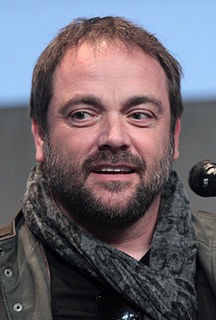
Radio drama is a dramatised, purely acoustic performance. With no visual component, radio drama depends on dialogue, music and sound effects to help the listener imagine the characters and story: "It is auditory in the physical dimension but equally powerful as a visual force in the psychological dimension." Radio drama includes plays specifically written for radio, docudrama, dramatized works of fiction, as well as plays originally written for the theatre, including musical theatre and opera.
Marc Warren is an English actor, known for his British television roles. His roles have included Albert Blithe in Band of Brothers, Danny Blue in Hustle, Dougie Raymond in The Vice, Dominic Foy in State of Play, Rick in Mad Dogs, the Comte de Rochefort in The Musketeers and the Gentleman in Jonathan Strange & Mr Norrell.
A miniseries is a television program that tells a story in a predetermined, limited number of episodes. The term "serial" is used in the United Kingdom and in other Commonwealth nations, though its meaning does not necessarily equate to "miniseries" in its usage.

Christopher Eccleston is an English actor. The recipient of an Emmy Award and two BAFTA Award nominations, Eccleston is best known for his work on television and in film – in particular for his collaborations with directors Danny Boyle and Michael Winterbottom and writers Peter Flannery, Jimmy McGovern and Russell T. Davies.

Colditz is a Big Finish Productions audio drama based on the long-running British science fiction television series Doctor Who.
Michael James, known professionally as Michael Jayston, is an English actor. He played Nicholas II of Russia in the movie Nicholas and Alexandra in 1971. He has also made many television appearances, which have included playing the Valeyard in all fourteen episodes of the 1986 Doctor Who serial The Trial of a Time Lord and appearing in the 1996 Only Fools and Horses episode Time on Our Hands as Raquel's father, James.

The Ark is the fifth serial of the third season of the British science fiction television series Doctor Who, which was first broadcast in four weekly parts from 5 to 26 March 1966.

Philip Madoc was a Welsh actor. He performed many stage, television, radio and film roles, and was recognised for having a "rich, sonorous voice" and often playing villains and officers. On television, he starred as David Lloyd George in The Life and Times of David Lloyd George (1981) and DCI Noel Bain in the detective series A Mind to Kill (1994-2002). His guest roles included multiple appearances in the cult series The Avengers (1962–68) and Doctor Who (1968-1979), as well as playing the U-boat captain in the Dad's Army episode "The Deadly Attachment" (1973). He was also known to be an accomplished linguist.
Barry Leopold Letts was an English actor, television director, writer and producer, best known for being the producer of Doctor Who from 1969 to 1974.

Jay Novello was an American radio, film, and television character actor.

Buck Rogers in the 25th Century is an American science fiction adventure television series produced by Universal Studios. The series ran for two seasons between September 1979 and April 1981, and the feature-length pilot episode for the series was released as a theatrical film before the series aired. The film and series were developed by Glen A. Larson and Leslie Stevens, based on the character Buck Rogers created in 1928 by Philip Francis Nowlan that had previously been featured in comic strips, novellas, a serial film, and on television and radio.
"Life Serial" is the fifth episode of season 6 of the television series Buffy the Vampire Slayer.
Dudley George Simpson was an Australian composer and conductor. He was the Principal Conductor of the Royal Opera House orchestra for three years, although he is best known for his work as a composer on British television, especially his long association with the BBC science-fiction series Doctor Who, for which he composed incidental music during the 1960s and 1970s. When Simpson died aged 95 in 2017, The Guardian wrote that he was "at his most prolific as the creator of incidental music for Doctor Who in the 1960s and 70s, contributing to 62 stories over almost 300 episodes – more than any other composer."
Cezanne Khan is an Indian television actor. He is known for his role of Anurag Basu in Kasautii Zindagi Kay, that aired on Star Plus. He has played various, critically acclaimed roles on Pakistani television too.

Mark Andreas Sheppard is a British-American actor and musician. He is often credited as Mark A. Sheppard. Sheppard is known for playing the demon/King of Hell Crowley on Supernatural and for his recurring roles as lawyer Romo Lampkin on the Battlestar Galactica reboot, Interpol investigator James Sterling on Leverage, and small-time crime lord Badger on Joss Whedon's Firefly.

The Invisible Man is a six-part television serial based on the science fiction/fantasy novella by H. G. Wells, screened by the BBC in the UK throughout September and October 1984. It was produced as part of the BBC 1 Classic Serial strand, which incorporated numerous television adaptations of classic novels screened in serial form on Sunday afternoons. Out of all the numerous film and TV versions of H. G. Wells' 1897 book, this remains to date the most faithful to the original text. The series was adapted by James Andrew Hall and directed by Brian Lighthill.

Roy Barcroft was an American character actor famous for playing villains in B-Westerns and other genres. From 1937 to 1957, he appeared in more than 300 films for Republic Pictures. Film critic Leonard Maltin acclaimed Barcroft as "Republic Pictures' number one bad guy".

Lego Star Wars III: The Clone Wars is a Lego-themed action-adventure video game based on The Clone Wars animated film and its follow-up television series with the same name, both of them set between the films Star Wars: Episode II – Attack of the Clones and Star Wars: Episode III – Revenge of the Sith. The game was developed by Traveller's Tales, published by LucasArts, and released in March 2011 for the PlayStation 3, PlayStation Portable, Xbox 360, Wii, Nintendo DS, Microsoft Windows and Nintendo 3DS consoles. Lego Star Wars III features missions and characters from The Clone Wars film and television series, as well as favourite characters from the original Star Wars saga, in both single-player and multiplayer gameplay modes. The Mac OS X version of the game has been released by Feral Interactive.
A serial film,film serial, movie serial, or chapter play, is a motion picture form popular during the first half of the 20th century, consisting of a series of short subjects exhibited in consecutive order at one theater, generally advancing weekly, until the series is completed. Generally, each serial involves a single set of characters, protagonistic and antagonistic, involved in a single story, which has been edited into chapters after the fashion of serial fiction and the episodes cannot be shown out of order or as a single or a random collection of short subjects.










